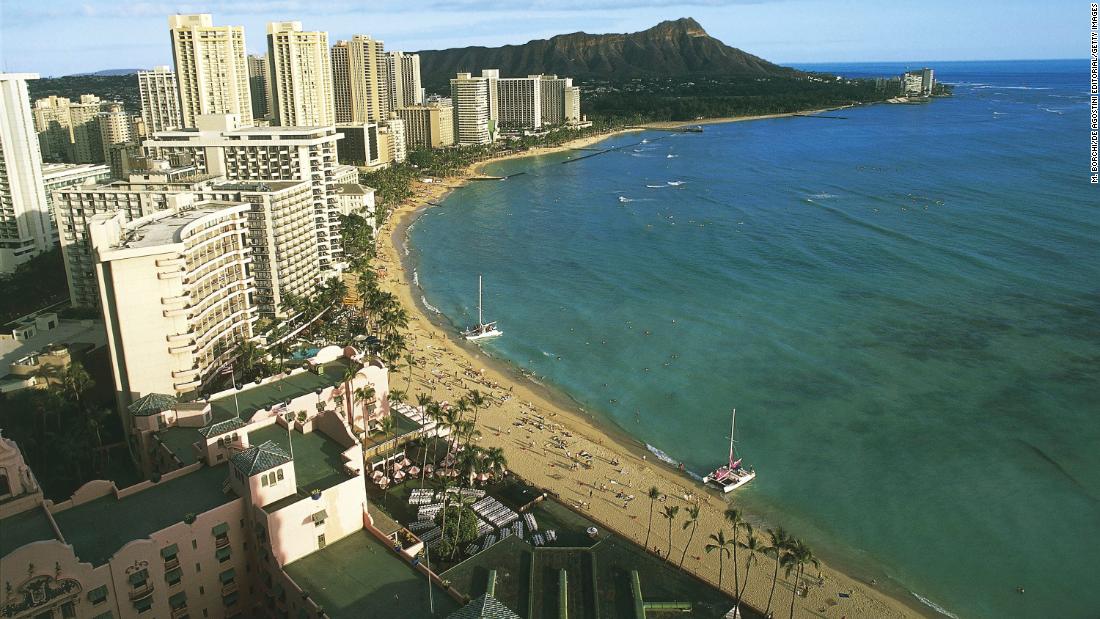
If recent climate reports about Hawaii are true, the Democratic legislator said, after she finishes high school, she may not be able to lie in the sun on Waikiki Beach the way generations before her could.
For six years, Lee has been chairman of the state's Energy & Environmental Protection Committee, where he helped earn the state a reputation as a model for how to bridge the political divide and deal with climate change.
He's co-sponsor of a bill that responds to a 2017 Hawaii Climate Commission report that argues Oahu's famed beaches at Waikiki are in danger of being underwater in the next 15-20 years due to rising sea levels.
A new bill would help protect Waikiki and Honolulu
As waters encroach on the beach, the bill notes that "Data shows that Honolulu is expected to begin seeing regular flooding of the urban core in as little as 15 years."
If the state loses Waikiki Beach, it would lose the $2 billion in annual revenue from tourists who flock to the area, Lee said, and if a major hurricane strikes Hawaii, the damage could total $40 billion.
The state's Senate and House of Representatives have both passed a measure, HB 1487, that establishes a "climate protection pilot project" for the Honolulu shoreline. The project would address the threat of "sea level rise, floodwater, storms, and other impacts of a rapidly changing climate." The bill also includes a provision for the state to study the creation of a carbon tax.
This week both houses are looking to reconcile the slightly different versions of the bill and send a finished product to Gov. David Ige's desk.
The cost of the statewide infrastructure upgrades would likely be in the tens of millions, but Lee said that's a "drop in the bucket compared to the cost of doing nothing."
Leading the nation in fighting climate change
As a set of islands in the Pacific, and with an economy that relies on beach tourism, Hawaii is uniquely vulnerable to the threat of rising sea levels, higher tides, and stronger storm surges wrought by global climate change.
But lawmakers have been taking action. Lee said this latest measure is a logical next step in a series of bills the state has enacted over the past five years, which included two key acts in 2015. One of those measures put Hawaii on track to use 100% renewable energy, while another moved to eliminate the use of fossil fuels in ground transportation. Another first-in-the-nation bill, passed in 2018, sought to make the entire state's economy carbon-neutral by 2045.
Those accomplishments stemmed from a 2014 measure Lee championed that led to creating Hawaii's interagency Climate Commission. That consensus among the public and policymakers is "ultimately where we think the politics of climate are going more generally," he said.
To gird against the rising sea levels, Hawaii will have to upgrade infrastructure in various ways in different parts of the state. At Waikiki, that means hardened physical barriers. But besides renewing the area in the long-term, the measures could help create jobs in the short term.
Building a consensus, and a model for other states
Lee said he and colleagues have shared Hawaii's lessons with other states with vulnerable coastlines, helping them create policies to resist the negative effects of climate change. "We've worked with a dozen states going down this pathway," he said.
Because Hawaii already has a consensus of legislators and the general public that climate change is real and a danger, policymakers were able to move more quickly in implementing fixes.
One pleasant surprise Lee noted stemmed from the state's efforts to move to 100% renewable energy, a move that faced resistance over its cost. "We expected it to cost billions," Lee said, but when utilities did their due diligence, they found it would save $5.5 billion.
"You just don't know how much savings you can have until you investigate," he said.
No comments:
Post a Comment